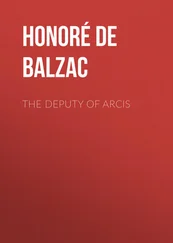The Chouans approved of her speech by unanimous smiles.
“Do you see nothing in all that to make you blush?” said the young man, in a low voice. “Are you in such need of money that you must pillage on the high-road?”
“I am so eager for it, marquis, that I should put my heart in pawn if it were not already captured,” she said, smiling coquettishly. “But where did you get the strange idea that you could manage Chouans without letting them rob a few Blues here and there? Don’t you know the saying, ‘Thieving as an owl’?—and that’s a Chouan. Besides,” she said, raising her voice to be heard by the men, “it is just; haven’t the Blues seized the property of the Church, and our own?”
Another murmur, very different from the growl with which the Chouans had answered their leader, greeted these words. The young man’s face grew darker; he took the young lady aside and said in the annoyed tone of a well-bred man, “Will those gentlemen be at La Vivetiere on the appointed day?”
“Yes,” she replied, “all of them, the Claimant, Grand-Jacques, and perhaps Ferdinand.”
“Then allow me to return there. I cannot sanction such robbery. Yes, madame, I call it robbery. There may be honor in being robbed, but—”
“Well, well,” she said, interrupting him, “then I shall have your share of the booty, and I am much obliged to you for giving it up to me; the extra sum will be extremely useful, for my mother has delayed sending me money, so that I am almost destitute.”
“Adieu!” cried the marquis.
He turned away, but the lady ran after him.
“Why won’t you stay with me?” she said, giving him the look, half-despotic, half-caressing, with which women who have a right to a man’s respect let him know their wishes.
“You are going to pillage that coach?”
“Pillage? what a word!” she said. “Let me explain to you—”
“Explain nothing,” he said, taking her hand and kissing it with the superficial gallantry of a courtier. “Listen to me,” he added after a short pause: “if I were to stay here while they capture that diligence our people would kill me, for I should certainly—”
“Not kill them,” she said quickly, “for they would bind your hands, with all the respect that is due to your rank; then, having levied the necessary contribution for their equipment, subsistence, and munitions from our enemies, they would unbind you and obey you blindly.”
“And you wish me to command such men under such circumstances? If my life is necessary to the cause which I defend allow me at any rate to save the honor of my position. If I withdraw now I can ignore this base act. I will return, in order to escort you.”
So saying, he rapidly disappeared. The young lady listened to his receding steps with evident displeasure. When the sound on the dried leaves ceased, she stood for a moment as if confounded, then she hastily returned to the Chouans. With a gesture of contempt she said to Marche-a-Terre, who helped her to dismount, “That young man wants to make regular war on the Republic! Ah, well! he’ll get over that in a few days. How he treated me!” she thought, presently.
She seated herself on the rock where the marquis had been sitting, and silently awaited the arrival of the coach. It was one of the phenomena of the times, and not the least of them, that this young and noble lady should be flung by violent partisanship into the struggle of monarchies against the spirit of the age, and be driven by the strength of her feelings into actions of which it may almost be said she was not conscious. In this she resembled others of her time who were led away by an enthusiasm which was often productive of noble deeds. Like her, many women played heroic or blameworthy parts in the fierce struggle. The royalist cause had no emissaries so devoted and so active as these women; but none of the heroines on that side paid for mistaken devotion or for actions forbidden to their sex, with a greater expiation than did this lady when, seated on that wayside rock, she was forced to admire the young leader’s noble disdain and loyalty to principle. Insensibly she dropped into reverie. Bitter memories made her long for the innocence of her early years, and regret that she had escaped being a victim of the Revolution whose victorious march could no longer be arrested by feeble hands.
The coach, which, as we now see, had much to do with the attack of the Chouans, had started from the little town of Ernee a few moments before the skirmishing began. Nothing pictures a region so well as the state of its social material. From this point of view the coach deserves a mention. The Revolution itself was powerless to destroy it; in fact, it still rolls to this present day. When Turgot bought up the privileges of a company, obtained under Louis XIV., for the exclusive right of transporting travellers from one part of the kingdom to another, and instituted the lines of coaches called the “turgotines,” all the old vehicles of the former company flocked into the provinces. One of these shabby coaches was now plying between Mayenne and Fougeres. A few objectors called it the “turgotine,” partly to mimic Paris and partly to deride a minister who attempted innovations. This turgotine was a wretched cabriolet on two high wheels, in the depths of which two persons, if rather fat, could with difficulty have stowed themselves. The narrow quarters of this rickety machine not admitting of any crowding, and the box which formed the seat being kept exclusively for the postal service, the travellers who had any baggage were forced to keep it between their legs, already tortured by being squeezed into a sort of little box in shape like a bellows. The original color of coach and running-gear was an insoluble enigma. Two leather curtains, very difficult to adjust in spite of their long service, were supposed to protect the occupants from cold and rain. The driver, perched on a plank seat like those of the worst Parisian “coucous,” shared in the conversation by reason of his position between his victims, biped and quadruped. The equipage presented various fantastic resemblances to decrepit old men who have gone through a goodly number of catarrhs and apoplexies and whom death respects; it moaned as it rolled, and squeaked spasmodically. Like a traveller overtaken by sleep, it rocked alternately forward and back, as though it tried to resist the violent action of two little Breton horses which dragged it along a road which was more than rough. This monument of a past era contained three travellers, who, on leaving Ernee, where they had changed horses, continued a conversation begun with the driver before reaching the little town.
“What makes you think the Chouans are hereabouts?” said the coachman. “The Ernee people tell me that Commandant Hulot has not yet started from Fougeres.”
“Ho, ho, friend driver!” said the youngest of the travellers, “you risk nothing but your own carcass! If you had a thousand francs about you, as I have, and were known to be a good patriot, you wouldn’t take it so easy.”
“You are pretty free with your tongue, any way,” said the driver, shaking his head.
“Count your lambs, and the wolf will eat them,” remarked another of the travellers.
This man, who was dressed in black, seemed to be about forty years old, and was, probably, the rector of some parish in the neighborhood. His chin rested on a double fold of flesh, and his florid complexion indicated a priest. Though short and fat, he displayed some agility when required to get in or out of the vehicle.
“Perhaps you are both Chouans!” cried the man of the thousand francs, whose ample goatskin, covering trousers of good cloth and a clean waistcoat, bespoke a rich farmer. “By the soul of Saint Robespierre! I swear you shall be roughly handled.”
Читать дальше












